Radio Derby: 40 years fact file
- Published
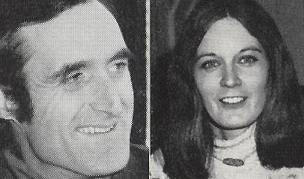
Mike Warr and Jackie Brogan presented Radio Derby's first programmes
BBC Radio Derby - A brief history of time
1971 BBC Radio Derby goes on air early in a temporary studio at the Sutton Coldfield VHF transmitter to cover the Rolls-Royce crash. Programmes are presented by Mike Warr and Jackie Brogan. The official start takes place at 5.50pm on 29 April in Derby.
1972 With the fate of the league championship in the hands of others, Brian Clough was on holiday in the Channel Islands. Live on-air, BBC Radio Derby breaks the news to the Rams manager that Derby County have won the championship
1973 The station provides live commentary on the Rams' European Cup matches including the Spartak Travana match in Czechoslovakia and the Juventus semi final in Turin
1974 John Burton takes over the weekday mid morning show Line Up.
1975 Presenter Kit Poxon marries Commonwealth gold medallist and 1972 Olympic squad weightlifter Tony Ford at Findern Parish Church.
1976 Late Night Derby, the programme introduced as a temporary measure during the power cuts ends its three-year run on Christmas Eve.
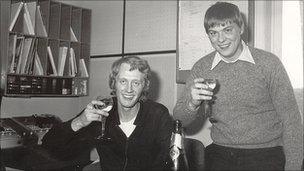
1979: Simon Shaw and Paul Baird completed a record-breaking 45-hour show
1977 BBC Radio Derby's future as a public service broadcaster in doubt as a government committee contemplates handing over BBC local radio to the commercial sector amid strong opposition from listeners and local organisations.
1978 BBC Radio Derby's Up and About programme comes live all week from Osnabruck in Germany to reflect the Week of Friendship for its twin town.
1979 Paul Baird and Simon Shaw talk their way into the Guinness Book of Records with a non-stop 45-hour programme.
1980 Afternoon Special presented by Dennis McCarthy is launched on BBC Radio Derby between 2pm and 4pm every weekday afternoon. It starts as a five month experiment but carries on well into the 1990s.
1981 Station manager John Bright announces that BBC Radio Derby, as it celebrates 10 years of broadcasting, is the second most popular BBC local radio station in the country. As part of the birthday celebrations a major history series is announced on the city of Derby, called Settlement to City, compiled by Roy Christian.
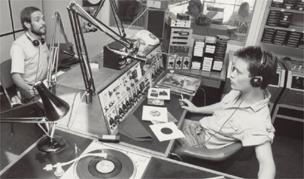
Terry Christian (right) presented the award-winning Barbed Wireless in the early 1980s
1982 The 21-year-old Terry Christian is plucked from the dole queue in Manchester to present the station's new weekday new youth programme from 6 till 7pm. He was spotted asking awkward questions on a Granada TV programme.
1983 The first Money Mountain is launched, raising more than £23,000 for the Macmillan Unit in Derby. Old favourite Maureen Axelrod returns to the airwaves on Saturdays and Chris Baird launches a new family show called Springboard.
1984 BBC Radio Derby launches the 15-part Derby County Story to mark the Rams' centenary.
1985 Sunday Sound wins the Sandford St Martin Award for religious broadcasting.
1986 Terry Christian's Barbed Wireless wins its second Gold Sony award.
1987 BBC Radio Derby bus is launched, complete with a ram's head motif across the side.
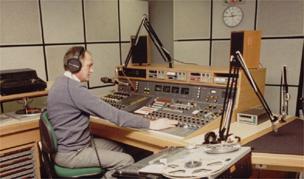
1989: Radio Derby's new studios come into use and Peter Gore demonstrates the new equipment
1988 FM 95.3 transmitter at Stanton Moor is switched on to cover North Derbyshire.
1989 New York International Radio Festival Silver Medal for coverage of the Kegworth air disaster.
1990 The newly extended and refurbished station is opened by BBC Governor Bill Jordan.
1991 Dennis McCarthy is awarded an MBE for his services to broadcasting.
1992 Bryan Harris, the bow-tied manager of Radio Derby, retires after 10 years at the helm.
1994 Andy Whittaker takes over from Ian Skelly as the Breakfast Show presenter.
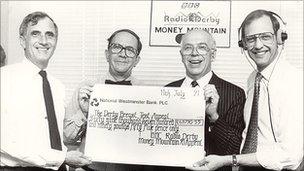
1990 was a record year for Money mountain - raising more than £69,000 for the Derby Breast Test Appeal
1995 The Breakfast Show comes live from East Midlands Airport to mark its 21st Birthday.
1996 BBC Radio Derby mounts a mammoth election outside broadcast from the Assembly Rooms in the city. For the first time in years all of Derby's council seats came up for election in preparation for the unitary authority.
1997 The Queen opens Pride Park Stadium, the new Derbyshire Children's Hospital and visits the Royal School for the Deaf. A major outside broadcast covers Her Majesty's visit to the city.
1998 The station spends a Week In A Window, broadcasting from Cooper's Square, Burton.
1999 John Holmes takes his bike (and show) out for a week of Pedal in the Peak.
2000 BBC Radio Derby records its largest audience ever, making it market leader in Derbyshire and East Staffordshire.
2001 BBC Radio Derby celebrates 30 years on air. For its 30th birthday BBC Radio Derby takes to the road visiting 30 places in a bus built in 1971, the year the station went on-air. The listeners also vote Brian Clough the most influential person of the past 30 years across Derbyshire and East Staffordshire. Later that year, Buxton and its surrounding villages hear BBC Radio Derby for the first time - the new 96FM transmitter is switched on to serve 21,000 people in the area.
2002 BBC Radio Derby unveils its brand new, purpose-built interactive bus. It is equipped with broadcasting equipment together with a suite of computer facilities, and tutors travel on board to teach IT skills. The BBC Bus travels to a different location in Derbyshire and East Staffordshire each week day - bringing learning opportunities and broadcasts to everyone's doorstep. It is also the year the station's current editor, Simon Cornes, takes over from Mike Bettison.
2003 The station wins a Sony Radio academy gold award for its news coverage of the controversial funding of the Queen's Golden Jubilee celebration at Pride Park Stadium.
2004 The station becomes available to listen live around the world on the internet. It also officially opens its brand new Matlock studio in the Derbyshire Dales District Council offices. Competition winner Brenda Mather is invited to cut the ribbon, having won a VIP day out which included being chauffeured to the studio in a stretched limousine.
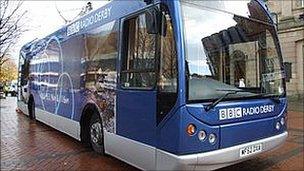
2002: The unveiling of the bus allowed communities to come to Radio Derby - and Radio Derby to come to communities
2005 BBC Radio Derby teams up with the BBC's Nigerian partner station Ray Power via satellite for a discussion on Nigerian world cup footballer Taribo West who played for Derby County in 2000. Radio Derby also supports a campaign to send Rams fans' old football shirts to West's home town of Port Harcourt.
2006 After a suggestion from a listener, Andy Whittaker asks his Breakfast show listeners to design and vote on a design for a Derbyshire flag. It is flown for the first time on Friday, 22nd September at simultaneous ceremonies at Derby Cathedral, The Buxton campus of the University of Derby, Ashbourne Town Hall and Ripley Town Hall. Since then the flag can be seen across the county and 22 September has become the focus of an annual Derbyshire Day event where the station celebrates the people, culture, food and traditions of the county.
2007 The Community Champions Awards are launched to recognise people who go the extra mile to do great work helping others. It is also the year presenter Andy Whittaker clocked up his 3,000th breakfast show. Radio Derby wins the Sony Radio Academy Station of the Year award.
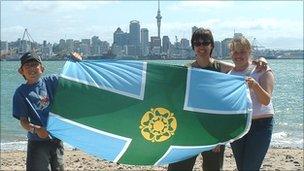
The Derbyshire flag can now be seen all over the world - like this one across the bay from Auckland, New Zealand
2008 The station's annual charity fund raiser, Money Mountain, finally comes to an end in 2008 after years of supporting local good causes through the generosity of its listeners. Over the years it raised a grand total of more than £1m for local good charities and other organisations doing great work in the community.
2009 BBC Radio Derby is named BBC Local Radio Station of the Year. It is also the year the station takes to the road; 'Route 38' followed the A38 through Radio Derby's area from Alrewas, in the South, to South Normanton, in the North.
2010 BBC Radio Derby wins the Sony Radio Academy station of the year award again in 2010, the only BBC local radio station to do this so far. And the station has been nominated again in 2011.
- Published15 March 2011